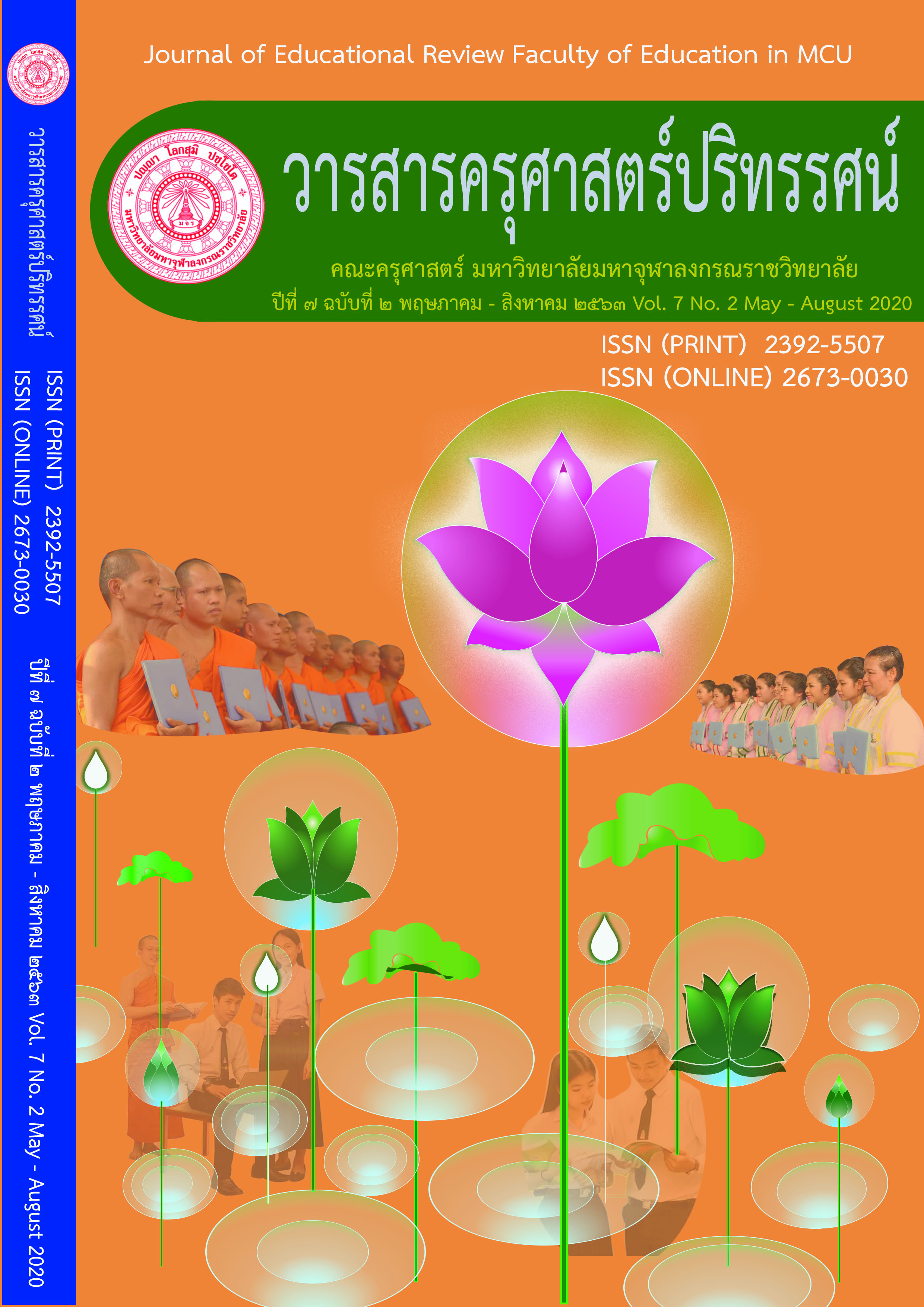GUIDELINES FOR DEVELOPMENT OF MORAL BEHAVIORS ACCORDING TO THE ETHICAL STANDARD ACT B.E. 2562 OF SCHOOL ADMINISTRATORS UNDER THE SECONDARY EDUCATIONAL SERVICE AREA OFFICE 1
Main Article Content
Abstract
The purposes of this research were to study and to compare, the present state, and the expected state and the priority need of moral behaviors of school administrators under the secondary educational service area office1 including to propose the guidelines for development of moral behaviors according to the ethical standards act B.E. 2562 of school administrators under the secondary educational service area office 1. The instrument used was a questionnaire, semi-structured interviews and suitability assessment form. The data were analyzed in terms of percentage, mean, standard deviation, PNImodified t-test and ANOVA. The results revealed as follows. The present state of moral behaviors according to the ethical standards act B.E. 2562 of school administrators was at the high to the very high level in all seven aspects. The expected state was at the very high level in all seven aspects. Those aspects were arranged in order of priorities are needed as the following: First, performing duties fairly without discrimination. The comparison between teachers ’opinions of the present state and the expected state on moral behaviors of school administrators classified by work experiences and classified by educational background, found that those of all had no statistically significant different but school size had statistically significant different at the .05 level. Guidelines for development of moral behaviors according to the ethical standards act B.E. 2562 of school administrators under the secondary educational service area office 1 are comprised of 1) Guidelines for development on moral behaviors according to the priorities are needed. 2) Strengthening guidelines on moral behaviors from related agencies.
Article Details
ทัศนะและความคิดเห็นที่ปรากฏในบทความในวารสารฉบับนี้ถือเป็นความรับผิดชอบของผู้เขียนบทความนั้นเพียงผู้เดียว และไม่ถือเป็นทัศนะและความรับผิดชอบของกองบรรณาธิการ
กองบรรณาธิการขอสงวนสิทธิ์ในการคัดเลือกบทความลงตีพิมพ์และจะแจ้งให้เจ้าของบทความทราบหลังจากผู้ประเมินบทความตรวจอ่านบทความแล้ว
ต้นฉบับที่ได้รับการตีพิมพ์ในวารสารครุศาสตร์ปริทรรศน์ คณะครุศาสตร์ มหาวิทยาลัยมหาจุฬาลงกรณราชวิทยาลัย ถือเป็นกรรมสิทธิ์ของคณะครุศาสตร์ มหาวิทยาลัยมหาจุฬาลงกรณราชวิทยาลัย ห้ามนำข้อความทั้งหมดหรือบางส่วนไปพิมพ์ซ้ำ เว้นเสียแต่ว่าจะได้รับอนุญาตจากมหาวิทยาลัยฯ เป็นลายลักษณ์อักษร
References
ข้อบังคับคุรุสภาว่าด้วยแบบแผนพฤติกรรมตามจรรยาบรรณของวิชาชีพ. (2550). ราชกิจจานุเบกษา เล่มที่ 124 ตอนพิเศษ 50 ง (27 เม.ย. 2550).
ประภาพร จันทรัศมี. (2559). กลยุทธ์การบริหารโรงเรียนเพื่อเสริมสร้างความเข็มแข็งทางคุณธรรมจริยธรรมของนักเรียนประถมศึกษา. ดุษฎีนิพนธ์ครุศาสตรดุษฎีบัณฑิต. จุฬาลงกรณ์มหาวิทยาลัย.
พระราชบัญญัติมาตรฐานทางจริยธรรม พ.ศ. 2562. (2562). ราชกิจจานุเบกษา เล่มที่ 136 ตอนที่ 50 (15 เม.ย. 2562).
พระราชบัญญัติสภาครูและบุคลากรทางการศึกษา พ.ศ. 2546. (2546). ราชกิจจานุเบกษา เล่มที่ 120 ตอนที่ 52ก (24 พ.ค. 2546).
พูนสุข อุดม. (2558). ความเป็นครู. สงขลา: คณะศึกษาศาสตร์ มหาวิทยาลัยทักษิณ.
รุ่งชัชดาพร เวหะชาติ. (2560). คุณธรรมจริยธรรมสำหรับผู้บริหารมืออาชีพ. สงขลา: นำศิลป์โฆษณา.
วีนันท์กานต์ รุจิภักดิ์ และ เอมม่า อาสนจินดา. (2559). จริยธรรมในวิชาชีพครู. นครปฐม: สำนักพิมพ์มหาวิทยาลัยมหิดล.
ศูนย์ปฏิบัติการต่อต้านการทุจริต กระทรวงศึกษาธิการ. (2561). แผนปฏิบัติการป้องกันและปราบปรามการทุจริตและประพฤติมิชอบกระทรวงศึกษาธิการ. แหล่งที่มา http://www.reo2.moe.go.th/home/images/book/39PlanProtect.pdf สืบค้นเมื่อ 22 ก.ย. 2562.
สำนักงานเขตพื้นที่การศึกษามัธยมศึกษา เขต 1. (2562). ข้อมูลสารสนเทศ. แหล่งที่มา https://eservice.sesao1.go.th/info สืบค้นเมื่อ 22 ก.ย. 2562.
สำนักงานเลขาธิการคุรุสภา. (2546). พระราชบัญญัติสภาครูและบุคลากรทางการศึกษา พ.ศ. 2546. กรุงเทพมหานคร: โรงพิมพ์คุรุสภาลาดพร้าว.
สุชาดา นันทะไชย. (2554). จริยธรรมวิชาชีพสำหรับผู้บริหารทางการศึกษา. กรุงเทพมหานคร: โรงพิมพ์สามเจริญพาณิชย์(กรุงเทพ).
สุวิมล ว่องวาณิช. (2548). การวิจัยประเมินความต้องการจำเป็น. กรุงเทพมหานคร: สำนักพิมพ์แห่งจุฬาลงกรณ์มหาวิทยาลัย.
Boydell, T. (1985). Management self-development: A guide for managers, organizations and institution. Geneva: International Labour Office.
Cronbach, L. J. (1970). Essentials of Psychological Test. 4th ed. New York: Harper Collins.
Derick Meado. (2016). The Role of the Principal in Schools. From http://teaching.about.com/od/admin/tp/Role-Of-The-Principal.htm Retrieved September 30, 2019.
Krejcie and Morgan. (1970). Determining Sample Size for Research Activities. Educational and Psychological Measurement. 607-610.


